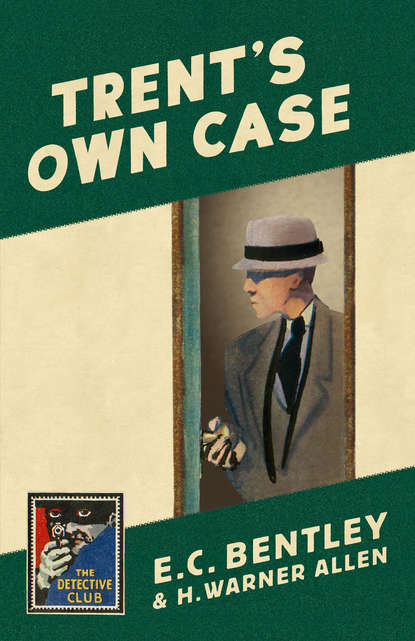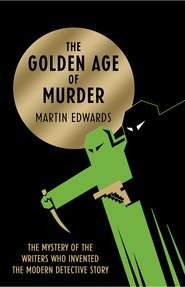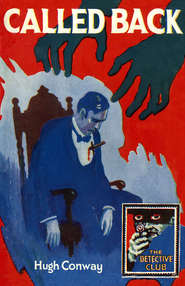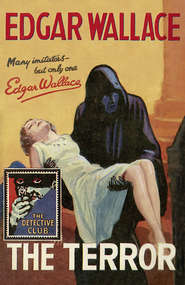По всем вопросам обращайтесь на: info@litportal.ru
(©) 2003-2024.
✖
Trent’s Own Case
Автор
Год написания книги
2019
Настройки чтения
Размер шрифта
Высота строк
Поля
‘Did he say “loony-doctors”?’ Mr Bligh cut in.
The valet hesitated. ‘He did not, sir; but he used some expression which the meaning of it was obviously that. And he said that the worst of them was that when they often got a bee in their bonnets themselves—that he did say, I’ll swear to it.’
The inspector smiled another wintry smile. ‘I said you were not hard of hearing,’ he commented. ‘Did anything more about this Dr Fairman come to your ears?’
‘Nothing that I can recall, sir.’
Mr Bligh sighed gently. At this hour the much-wanted Fairman, if he had caught the night-boat, as appearances suggested, might still be at his destination in Dieppe. On the other hand, his true destination was more than likely to be elsewhere, and he might be receding each moment farther beyond the reach of the English law’s long arm. The inspector strode to the sitting-room telephone, and soon was in touch with the same official to whom he had spoken before. He repeated briefly, for transmission to Dieppe, Raught’s description of the suspect, and asked that inquiries about him should be made immediately at the Randolph Mental Hospital at Claypoole, where he was one of the medical staff.
‘Now then,’ he resumed, turning to the valet who stood uneasily awaiting his attention, ‘before you went out, you left your master’s evening clothes ready for him?’
‘Yes, sir.’
‘Did you put out his razor?’
‘No, sir. I never knew him need to shave in the evening. I had left the razor on the shelf in the bathroom, with the other shaving things.’
‘Was there a blade in the razor?’
‘I had put in a new blade ready for next morning, sir. Mr Randolph liked to have a new one every day.’
‘And when you found his body, did you see the razor lying on the dressing-table?’
‘No, sir. I was too much upset to notice anything of that sort.’
‘You didn’t even see that there was a lot of brown paper and string on the floor?’
Raught dropped his eyes. ‘Now you mention it, sir, I did notice that—an untidy mess lying under the window, as if someone had been opening parcels. It slipped my memory sir—truly it did. And I never touched it.’
The inspector grunted. He had the impression that the valet was meeting all these inquiries with as much frankness as was in his nature. ‘Do you know,’ he asked, ‘if your master kept any valuables in his bedroom?’
The man hesitated. ‘None, sir, to my knowledge, except studs and links and that. But I—I fancy he had a safe set in the wall by the window.’
Mr Bligh’s face hardened. ‘Yah!’ he said ungracefully. ‘You fancy! Don’t you know?’
‘Well, sir,’ Raught said unhappily, ‘I have seen a keyhole.’
‘Of course you have,’ the inspector said brutally. ‘And the edges of the door too. The question is whether you know what was behind it.’
‘That I don’t indeed, sir,’ the valet protested. ‘And it was never opened in my presence.’
Mr Bligh still surveyed him with a disparaging eye. ‘Now, Raught,’ he said, ‘what can you tell me about this?’ He indicated the engagement-block standing on the Chinese cabinet. ‘Is that the usual place for it?’
The valet appeared genuinely startled. ‘It certainly is not, sir,’ he declared with emphasis. ‘That thing—I never remember seeing it there before. I have seen it often enough, and anyone could tell what it was for, sir, of course. Mr Randolph would often jot down an appointment on it when I was about. But he wasn’t ever communicative-like about his engagements—not that they were any business of mine. And this block, sir, was always treated like something specially private-like. He would always lock it away in a drawer of the writing-table—never once have I seen it left standing about like this. Most peculiar it is, to anyone knowing Mr Randolph’s ways.’ He shook his head portentously.
‘Well, that’s that,’ the inspector remarked after a moment’s rubbing of his chin. ‘Now come upstairs,’ he directed curtly. Raught’s leaden complexion became visibly less healthy as he was shepherded into the room where the body still lay.
‘Now, here’s another peculiar thing I want your opinion about.’ Mr Bligh pointed to the small heap of articles on the dressing-table. ‘Did Mr Randolph usually put the contents of his pockets here?’
‘Yes, sir. He always dressed here. There is no separate dressing-room.’
‘And have you ever seen anything of this sort among his personal effects?’ The inspector, watching the man’s face, indicated the champagne cork. ‘Can you think of any reason why he should have carried it about with him?’
Raught looked blankly at his questioner. ‘In the five years I have been with Mr Randolph, sir, I have never seen a cork among his things. It’s funny it should be that kind of a cork, too. He didn’t seem ever to care for sparkling wines. At home—at the place in Yorkshire, that is—he never touched them, though he kept champagne for his guests.’
‘Well,’ the inspector said sharply, ‘he might have had someone to lunch or dinner here, and given ’em champagne or something of the sort. You’d have known about that, I suppose.’
The valet shook his head decisively. ‘He never had lunch or dinner here, sir; let alone entertaining. When in London, he would have his meals mostly at the Lansdowne Club—that was where I had to ring him up in case of anything pressing. An egg and a bit of toast and a cup of tea in the morning—that is all the food I have ever known him take here. It wasn’t a ’ome, sir, not in any sense of the word. I had to cater for myself, that being allowed for in the wages—generous too. As for yesterday and the day before, he was out to lunch and dinner as usual. It’s true I wasn’t here at dinner-time being out for the evening; but I can answer for it there wasn’t enough in the place for what you might call a proper meal. And the only drink ever kept here was some brandy and bottles of seltzer, which Mr Randolph would sometimes have a drop of before going to bed. Besides,’ Raught went on after a brief pause, ‘he certainly intended dining out last night, sir—the Tabarders’ Company dinner it was to be—and he never missed anything to do with the Tabarders’.’
Mr Bligh looked interested. ‘Didn’t he?’ he said. ‘And why was that?’
‘Why, you see, sir,’ Raught explained, ‘Mr Randolph was a very large contributor to the Company’s charities—very munificent indeed, sir, I have heard; and he naturally liked the position it used to give him at their public occasions.’
Mr Bligh nodded. ‘Of course,’ he said. ‘Anybody would. And so,’ he added quickly, ‘you knew all about it being the Tabarders’ dinner-night, though you never saw what was written on the block, and Mr Randolph was never, I think you said, communicative-like about his engagements. Not only that; you knew all about how he felt on the subject of the Tabarders’ dinner. You seem to know a lot more than you pretend, Raught.’
The valet’s tottering self-control gave way at this. He wrung his hand together, and it was with a sobbing voice that he broke out in a suddenly degenerated speech: ‘That’s it! That’s the way! Leading of a man on till you get ’im in a corner, and set ’im up against himself. I ain’t told you nothing but what’s gospel, and you come making me out a liar. Why shouldn’t I know it was the Tabarders’ dinner-night? I got ears, ain’t I? Even if he didn’t say nothing to me, I ’eard him talking about it to Mr Verney ’alf a dozen times, if you want to know; and as for ’im likin’ to be made a fuss of, and to be told ’e was a-runnin’ over with the milk of ’uman kindness—ain’t we got a reg’lar staff of servants down at Brinton, and don’t they talk over the guvnor and his little ways? Not ’alf!’ Raught exclaimed with lachrymose fervour. ‘Crool, that’s what it is, a-badgerin’ a man what ain’t done nothing but his dooty about this ’ere business—sendin’ for the pleece as I did, and a-dealin’ with ’em honest and truthful. A chap what’s once gone wrong ain’t ever give a chance.’ Here the valet’s emotion overcame him, and he mopped his eyes in wordless misery.
‘There, that’s enough of that,’ Mr Bligh said heartlessly. ‘You’ve told me a lot more, my lad, than I’d have got out of you if I’d been soft with you. Now about this safe.’ He took up the key-case, and held out its contents in silence.
‘This ’ere’s the key of the street door downstairs,’ whimpered Raught. ‘I know that because I’ve got one that’s the same. I don’t know nothing about any of the others, I wish I may—’
‘That’ll do,’ the inspector snapped. He picked out without hesitation the key to fit the lock in the wall, and soon the interior of a small and shallow safe was exposed—completely empty. His eyes travelled to the small pile of wrappings still lying almost beneath the safe, and again his fingers caressed his hairless scalp.
CHAPTER V (#ulink_f239f4ba-dcba-5482-96c5-10baeb4d48a4)
TRENT IS TAKEN ABACK (#ulink_f239f4ba-dcba-5482-96c5-10baeb4d48a4)
TRENT stood at the sitting-room window of his small house in St John’s Wood, gazing at the sky and meditating on the enviable life lived by such men as old Blinky Fisher, in such lovely and well-tended retreats as the Cathedral Close at Glasminster. It was the evening of the day after his leave-taking of Aunt Judith at Victoria. He had driven down to Glasminster with his friend Patmore that morning, had surveyed the spectacle of Julian Pickett—looking rather more unnerved than a big-game hunter should—being married to a young woman who did not seem at all formidable; had foregathered with a number of old friends at the house of Canon Fisher, and had returned as he had gone.
The effect on his spirit had been, as he had known it would be, to discontent him with any way of life but that of the ‘mild, monastic faces, in quiet collegiate cloisters.’ Being not particularly pious, far from learned, and delighting in the society of his fellow men, Trent never came in contact with the life of piety, erudition and seclusion without yearning to be a part of it. It was, as he put it to himself in a familiar phrase of godliness and scholarship, too damned silly for words.
‘What a wonderful sunset, Mrs McOmish!’ Trent said.
His housekeeper, who was laying the table for his solitary dinner, glanced briefly at the flaming sky. ‘I’ve seen waur,’ she said. She was a person whose words, thought usually of the driest, were as usually highly charged with unspoken significance. In this case, Mrs McOmish contrived to convey the strongly held opinion that nothing was to be gained by encouraging either this sunset, or sunsets as a class.
Trent shook his head. ‘Sophisticated!’ he said sadly. ‘To you, Mrs McOmish, all nature is old, outmoded stuff, I suppose. The sublime, unapproachable self-sufficiency of art—that is your whole creed.’
‘No the whole,’ Mrs McOmish replied guardedly. ‘I dinna ken what a’ that means aboot airt, and it may be pairt of the confession of the United Presbyterian Kirk, but there’s a guid deal else forbye, I assure ye.’
‘I shouldn’t wonder,’ Trent said absently. ‘But a truce to theology, Mrs McOmish. We were talking animatedly about the sunset, and you were just going to recall to me those moving lines in which Sir Walter Scott describes a similar phenomenon in the neighbourhood of the Trossachs. But what says another poet, Mrs McOmish; the one who uttered nothing base, though occasionally something silly? It is, he observed, a beauteous evening, calm and free—’
‘Weel, we a’ ken there’s nae chairge for it,’ Mrs McOmish admitted.
‘The holy time is quiet as a nun, breathless with adoration—’
‘It’s a peety,’ Mrs McOmish commented with some severity, ‘he couldna appreciate the weather without being popish aboot it. There’s a gentleman turning in at the gate, Mr Trent. Is it a friend of yours? Is it like he’ll be staying to dinner?’
Trent looked at the tall, quietly dressed young man who was approaching the house. ‘I know who it is,’ he said, ‘though he is a good deal changed in his looks. He doesn’t give me the idea that dinner would agree with him just now—had some kind of a shock, I should think. Now,’—Trent went nearer to the window—‘what on earth can it be that he’s picking up from the path?’










